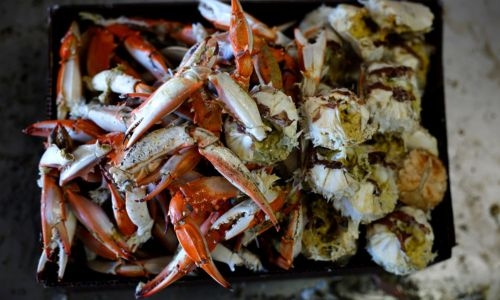The ban on crab fishing, also known as Qobqob in Bahrain, has officially been lifted by the executive body of the Supreme Council for the Environment (SCE). This decision comes after a two-month ban that was put in place on March 15 in order to protect and sustain the population of this iconic species in Bahraini waters. Qobqob is highly regarded in Bahraini culture as a delicacy, often referred to as the king of the beaches.
With the resumption of crab fishing, locals will once again be able to enjoy this cherished delicacy while also ensuring the long-term sustainability of the species. Due to a significant decline in crab populations, authorities have taken action to preserve them. Mr. Mohammed Al-Assam, the Director General of Marine Resources in the Executive Body of the SCE, emphasized that the ban on fishing, trading, or selling of crabs was necessary to protect the stock of marine species, especially during their crucial period of fertilization and reproduction.
The measures taken by the authorities have had a positive impact on the abundance of crab species in Bahrain’s waters, ultimately benefiting local markets during the hunting season. The Director General for Marine Resources also praised the fishing community for their cooperation and adherence to the ban during the period it was in place. This collaborative effort has played a key role in the successful protection and preservation of the crab population in Bahrain.
The lifting of the ban on crab fishing is a significant development for the fishing industry in Bahrain, as it allows for the continued enjoyment of this popular delicacy while also ensuring the conservation of the species for future generations. By implementing measures to protect the stock of marine species during their crucial reproductive period, authorities are taking proactive steps to maintain the ecological balance of Bahrain’s waters.
The decision to lift the ban on crab fishing is a testament to the commitment of the Bahraini government to the protection of marine resources and the sustainability of the fishing industry. By working closely with the fishing community and enforcing regulations to prevent overfishing, authorities are able to strike a balance between economic interests and environmental conservation. This collaborative approach is crucial in maintaining the delicate ecosystem of Bahrain’s waters.
In conclusion, the lifting of the ban on crab fishing in Bahrain is a positive development for both locals and the fishing industry. By prioritizing sustainability and conservation, authorities are able to ensure the long-term viability of crab populations in Bahrain’s waters. The collaborative efforts of the fishing community and government agencies have been instrumental in achieving this goal, setting a positive example for environmentally conscious practices in the region.










